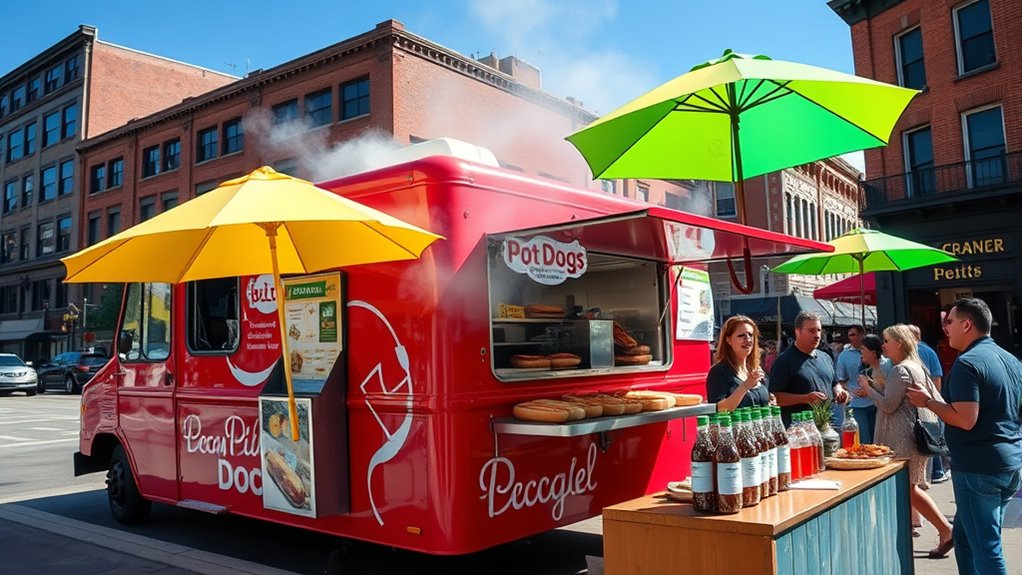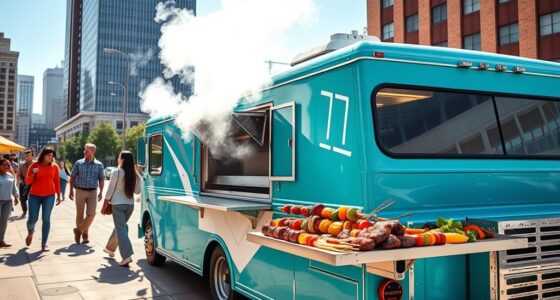To start a food truck in Buffalo, NY, you need to understand local regulations, including permits, sanitation standards, and designated parking zones. Tap into Buffalo’s diverse food scene by creating a unique menu highlighting regional flavors and local ingredients. Budget for your vehicle and equipment costs, explore funding options like crowdfunding or investors, and incorporate technology for smooth operations. Building strong community ties and creating eye-catching visuals will help grow your business. Keep going to discover all the essential steps in detail.
Key Takeaways
- Understand Buffalo’s local food scene trends and popular ethnic cuisines to develop a unique, appealing menu.
- Comply with Buffalo’s permitting, zoning, sanitation, and health regulations for legal food truck operation.
- Budget for vehicle costs, secure startup funding, and plan your menu and pricing to ensure profitability.
- Incorporate visual content and community engagement strategies to build brand awareness and foster local support.
- Set up reliable payment systems and inventory management tools for smooth daily operations and customer satisfaction.
Buffalo’s Vibrant Food Scene
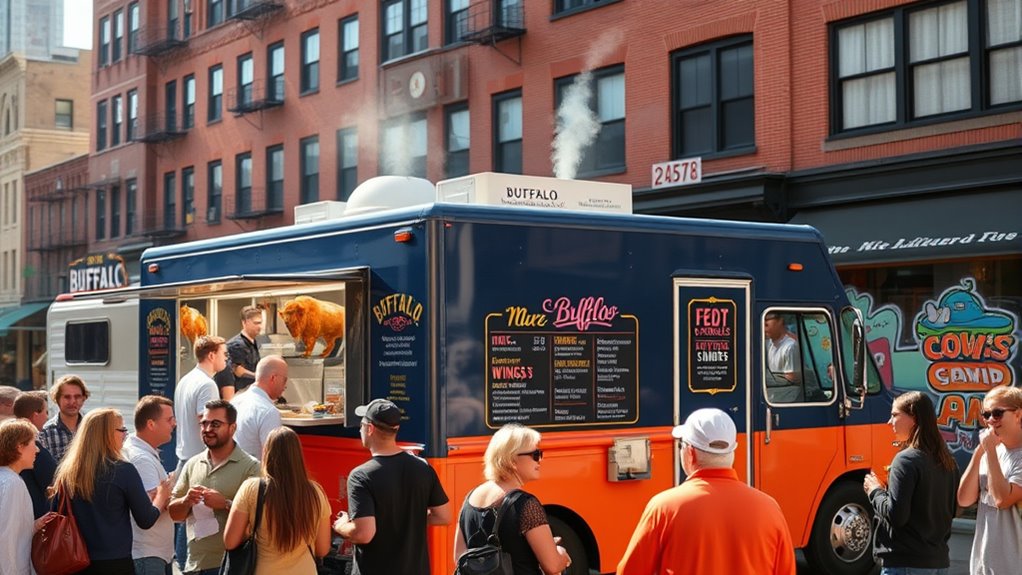
Buffalo’s food scene is alive with diverse flavors and innovative eateries that attract both locals and visitors alike. You’ll notice how local food festivals showcase the city’s culinary creativity, highlighting everything from classic Buffalo wings to international dishes. These events celebrate authentic tastes and foster community connections. Ethnic cuisine trends in Buffalo are thriving, with many restaurants experimenting with flavors from Asia, the Middle East, and Latin America. This vibrant mix encourages food truck owners like you to explore unique menus that appeal to a broad audience. The city’s dynamic food scene keeps evolving, making it an exciting place to start your food truck venture. Tapping into these trends will help you stand out and connect with a diverse, enthusiastic customer base. Additionally, the influence of Bollywood has inspired some local eateries to incorporate Indian spices and dishes, opening up even more opportunities for innovative offerings.
Understanding Local Requirements
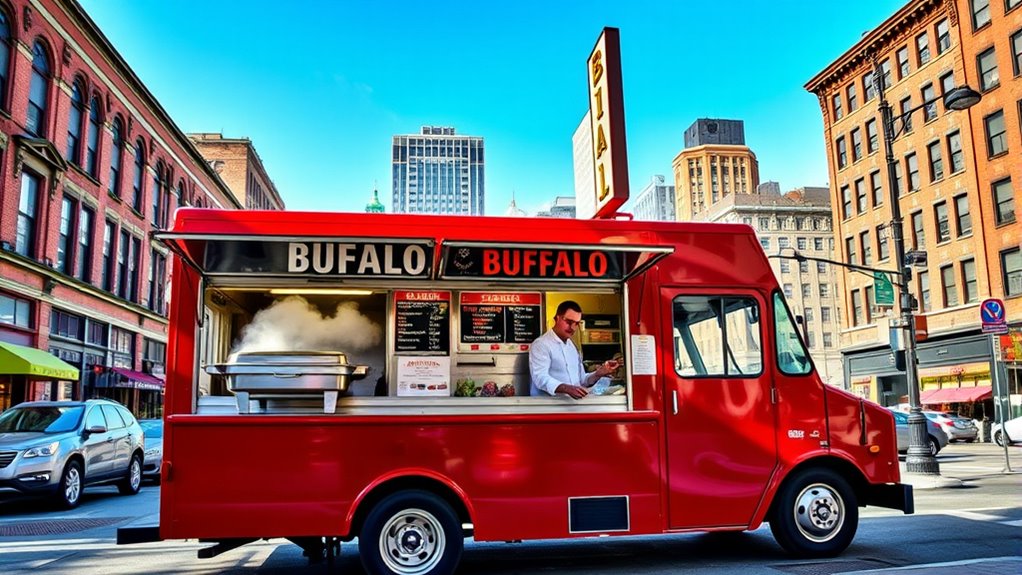
To get your food truck up and running in Buffalo, you need to understand the permit process and guarantee you meet sanitation standards. You’ll also want to familiarize yourself with designated zones where trucks are allowed to operate. Staying compliant with these requirements helps you avoid fines and keeps your business running smoothly. Incorporating wall organization systems can help you efficiently manage your supplies and equipment within your truck.
Buffalo Food Truck Permit Process
Charting the food truck permit process in Buffalo requires understanding several local regulations and completing specific applications. To start, you’ll need to obtain the proper food truck permits, which ensure your vehicle meets safety and health standards. Buffalo’s local licensing department handles the application process, requiring you to submit detailed documentation about your truck, menu, and business. You may also need to provide proof of insurance and pass a vehicle inspection. Be prepared for potential fees and inspections to verify compliance with city codes. It’s essential to review the Buffalo Department of Health’s guidelines and coordinate with city officials early on to avoid delays. Staying organized and understanding all the local licensing requirements will help you secure your permits smoothly and get your food truck on the road quickly.
Sanitation Protocols and Record-Keeping
Understanding sanitation protocols and record-keeping is crucial for maintaining compliance with Buffalo’s health regulations. You must follow strict hygiene standards to prevent contamination and ensure food safety. Regular cleaning schedules, proper storage, and handwashing procedures are critical parts of these protocols. Maintaining accurate records of cleaning logs, temperature checks, and food source documentation helps demonstrate your commitment to hygiene standards. Record accuracy is indispensable, as health inspectors may review these documents during inspections. Make sure your logs are detailed, up-to-date, and organized. Adhering to these protocols not only keeps your operation compliant but also builds trust with customers. Staying diligent with sanitation and record-keeping protects your business from penalties and promotes a safe environment for everyone.
Designated Food Truck Zones
Knowing where you can park and operate your food truck is just as important as maintaining proper sanitation. Buffalo has designated food truck zones that comply with local parking regulations, ensuring you stay within legal boundaries. These zones often specify exact locations where trucks are permitted, helping you avoid fines or citations. Be sure to check signage requirements, which may include specific signage indicating your food truck’s authorized area. Proper signage not only helps with compliance but also attracts customers. Familiarize yourself with city maps and official postings to identify approved zones. Staying within these designated areas ensures smooth operations and avoids conflicts with city authorities. Understanding and following these local requirements is key to establishing a successful and compliant food truck business.
Setting Up Your Base of Operations
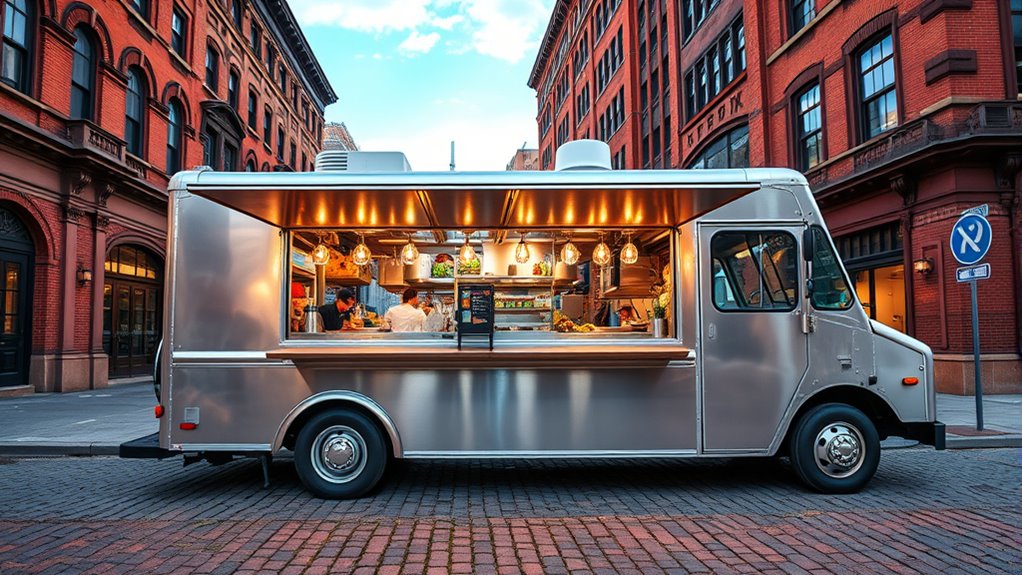
To establish your base of operations, you’ll need to comprehend shared kitchen licensing rules in Buffalo and how they pertain to your plans. Planning a custom kitchen layout guarantees everything runs smoothly and meets health standards. Taking these steps now helps you build a solid foundation for your food truck business.
Shared Kitchen Licensing Rules
Setting up your food truck’s base of operations often involves securing a shared kitchen license, which allows you to use a commercial kitchen space without owning one outright. This process is governed by shared kitchen licensing and kitchen co-op rules you must follow. To get started:
- Confirm the shared kitchen complies with Buffalo’s health and safety standards.
- Review the specific kitchen co-op rules for licensing requirements.
- Submit your application and necessary documentation to local health authorities.
- Maintain proper sanitation and storage practices as outlined in the shared kitchen licensing agreement.
Following these guidelines guarantees your operation meets legal standards and keeps your food truck business running smoothly. Understanding shared kitchen licensing and adhering to kitchen co-op rules is essential for a successful start.
Custom Kitchen Layout Planning
Designing your kitchen layout is a key step in establishing a functional and efficient food truck operation. Your kitchen layout should prioritize smooth equipment placement to streamline workflow and reduce unnecessary movement. Begin by mapping out zones for prep, cooking, cleaning, and storage, ensuring each area is logically connected. Place heavy or frequently used equipment, like grills and refrigerators, where they’re easily accessible without blocking pathways. Consider airflow and ventilation to maintain safety and comfort. Optimize space by choosing multi-purpose appliances and compact models. Remember, your layout affects speed, safety, and customer service. Take the time to plan carefully, measure your truck’s dimensions, and visualize how everything fits, so your kitchen operates seamlessly and meets your culinary needs.
Budgeting and Financing Your Food Truck
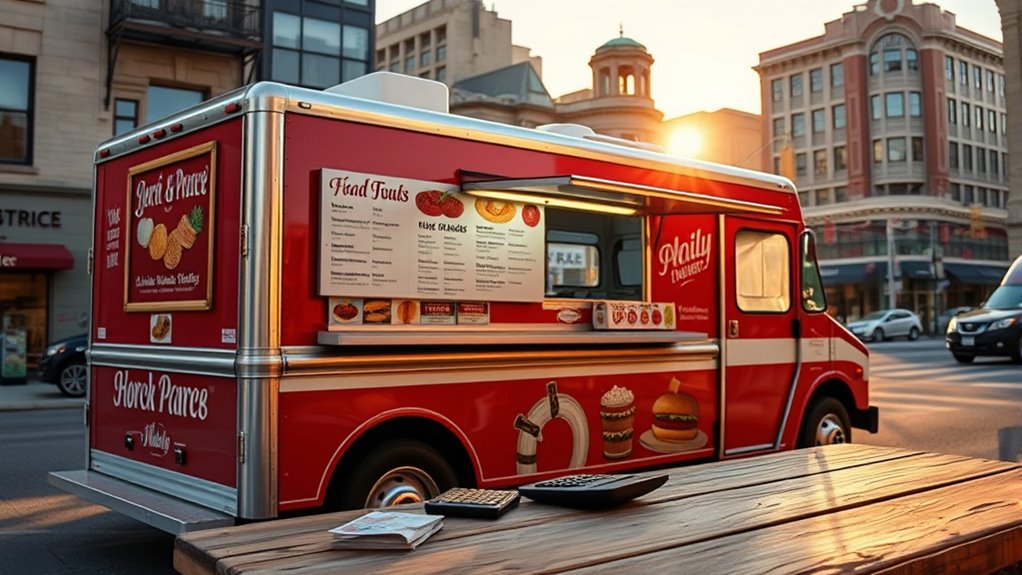
Getting your food truck off the ground requires careful planning around costs and funding. You’ll need to contemplate the purchase price of your vehicle, explore different sources of startup capital, and understand your liabilities and payroll needs. Addressing these points early ensures you build a solid financial foundation for your business. Additionally, understanding potential financial risks associated with transaction processing can help you select the most reliable merchant services and avoid costly pitfalls.
Initial Vehicle Purchase Costs
The initial vehicle purchase is one of your biggest upfront expenses when starting a food truck in Buffalo, NY. To manage costs effectively, consider these factors:
- Budget range: New trucks can cost $50,000–$100,000, while used vehicles are more affordable but may require more maintenance.
- Vehicle financing: Explore financing options to spread out payments and preserve cash flow.
- Depreciation considerations: Keep in mind that your truck will decrease in value quickly, affecting resale value and tax deductions.
- Vehicle type: Choose between a customized truck or a converted van, balancing upfront costs with operational needs.
Careful planning around these points helps you avoid overspending and ensures your investment aligns with your business goals.
Startup Capital Sources
Once you’ve considered your vehicle costs, the next step is securing the funds needed to launch your food truck business. You can explore various startup capital sources, such as fundraising events, which allow you to engage the community and generate funds quickly. Additionally, reaching out to angel investors can provide significant financial backing, especially if you have a solid business plan and unique concept. Crowdfunding platforms are also a viable option, helping you gather small investments from a broad audience. Be prepared to pitch your idea confidently, highlighting your menu, target market, and growth potential. Combining these sources will give you a diversified funding strategy, increasing your chances of successfully covering initial costs and getting your food truck on the road in Buffalo.
Liability and Payroll Considerations
Budgeting for liability and payroll costs is essential to guarantee your food truck operates smoothly and remains financially sustainable. Proper planning ensures you have adequate insurance coverage and correctly classify employees, which affects taxes and benefits. Here are key considerations:
- Secure extensive insurance coverage to protect against accidents, damages, and liability claims.
- Understand employee classification to determine if workers are employees or contractors, impacting payroll taxes.
- Budget for payroll expenses, including wages, benefits, and overtime, based on your staffing needs.
- Set aside funds for workers’ compensation and unemployment insurance to meet legal requirements.
Designing Your Menu and Pricing Strategy
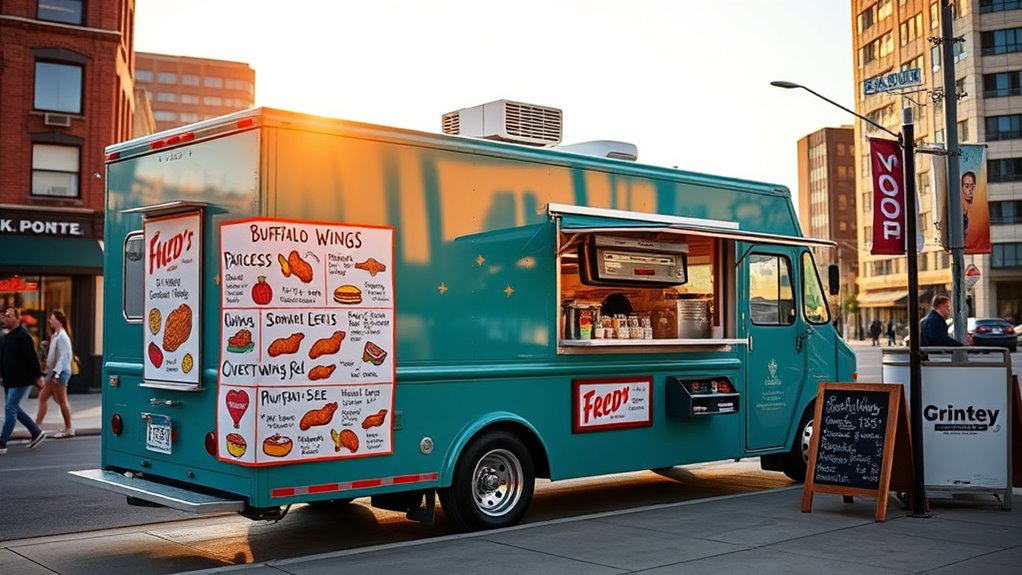
To succeed, you need a menu that appeals to Buffalo’s local tastes and ingredients. Focus on customizing dishes with regional flavors while managing ingredient costs carefully. This approach helps you set competitive prices and keep your margins healthy. Incorporating local ingredients and understanding their impact on flavor and cost can further enhance your offerings.
Customizing Dishes for Buffalo
Designing your menu and pricing strategy for Buffalo requires a deep understanding of local tastes and market demand. To stand out, focus on customizing dishes that highlight authentic buffalo flavor profiles. Here are four ways to do that:
- Incorporate regional ingredients like blue cheese and hot sauce to appeal to local preferences.
- Offer variations of classic Buffalo dishes, such as chicken wings with unique spice blends.
- Balance traditional flavors with innovative twists to attract diverse customers.
- Price dishes competitively, considering the local market and ingredient costs.
Ingredient Cost Control
Controlling ingredient costs is essential for maintaining profitability when creating your menu and setting prices. One effective strategy is seasonal ingredient sourcing, which allows you to buy fresh, high-quality produce at lower prices when it’s in peak season. This not only saves money but also enhances your dishes’ flavor. Additionally, take advantage of bulk purchasing discounts by buying ingredients in larger quantities. This reduces per-unit costs and helps you stay within your budget. Carefully designing your menu around these strategies ensures that you can offer appealing dishes without sacrificing profit margins. Regularly reviewing ingredient prices and adjusting your menu accordingly keeps your costs manageable. Ultimately, smart ingredient cost management supports a sustainable, profitable food truck business in Buffalo.
Technology and Operations

Implementing mobile payment app integrations makes transactions faster and more convenient for your customers. Using real-time stock tracking software helps you stay on top of inventory and avoid shortages. Together, these tools streamline your operations and keep your food truck running smoothly. Embracing trusted partnerships ensures reliable support and continuous growth for your business.
Mobile Payment App Integrations
Integrating mobile payment apps into your food truck operations streamlines transactions and enhances customer convenience. With cashless payments becoming standard, a mobile POS system allows quick, secure payments directly from smartphones. To optimize this integration, consider these key steps:
- Choose a mobile POS platform compatible with your device and service provider.
- Enable popular mobile payment apps like Apple Pay and Google Pay.
- Train staff to handle cashless payments efficiently.
- Make sure your Wi-Fi or data connection is reliable for seamless transactions.
Real-Time Stock Tracking Software
Since inventory management can be challenging on the go, adopting real-time stock tracking software helps you stay updated on your supplies instantly. This technology streamlines inventory management by providing real-time data, so you know exactly what’s in stock without manual checks. It simplifies supply chain logistics, ensuring you reorder ingredients before running out, preventing service delays. With real-time updates, you can track usage patterns and adjust purchasing schedules accordingly. This minimizes waste and maximizes profits. The software often integrates with your point-of-sale system, giving you a broad overview of sales and inventory levels simultaneously. By using these tools, you keep your food truck running smoothly, avoid stockouts, and focus on delivering great food and customer service—making your operations more efficient and responsive.
Marketing and Growing Your Presence
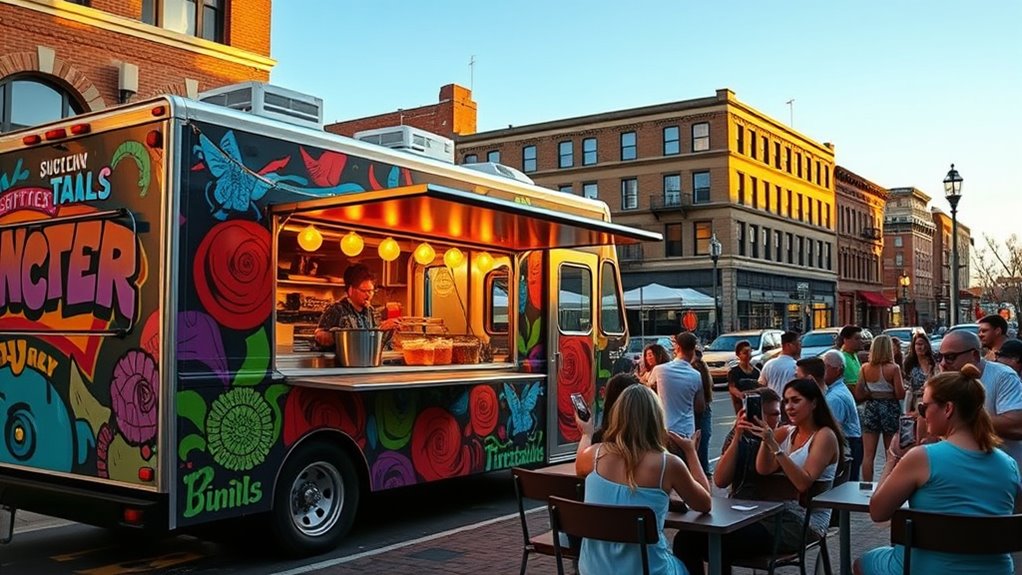
To build your presence, start by scheduling weekly events that draw in new customers and keep regulars coming back. Make sure to post engaging, high-quality food photos on Instagram to showcase your dishes and create buzz. Consistent updates and strategic event planning will help you grow your following and boost sales.
Weekly Event Scheduling Tips
Consistent weekly event scheduling is essential for building your food truck’s presence in Buffalo. It helps attract regular customers and strengthens your brand. To maximize your efforts, consider these tips:
- Pick the same days and times each week to establish predictability.
- Collaborate with other vendors to create appealing events that draw larger crowds.
- Use local event calendars to identify popular recurring opportunities.
- Promote your schedule through social media and direct outreach, emphasizing your weekly routine.
Focusing on weekly event scheduling and vendor collaboration keeps your brand top of mind. It encourages repeat visits and helps you stand out in Buffalo’s competitive food scene. Regular, well-planned appearances will grow your customer base and boost your food truck’s visibility.
Engaging Instagram Food Photos
Engaging Instagram food photos can substantially boost your food truck’s visibility in Buffalo. To capture attention, focus on food styling that highlights the most appealing aspects of your dishes. Use vibrant colors and arrange ingredients thoughtfully to make each photo pop. Lighting techniques are essential; natural light often works best, so shoot during the day near windows or outdoors. Avoid harsh shadows by diffusing sunlight with a sheer curtain or reflector. Keep backgrounds simple to keep the focus on your food. Incorporate close-up shots to showcase textures and details, making followers crave your offerings. Consistent, high-quality images will help build your brand and attract more customers. Remember, eye-catching photos are often the first impression, so invest effort into creating visually appealing content.
Local Community Engagement Strategies
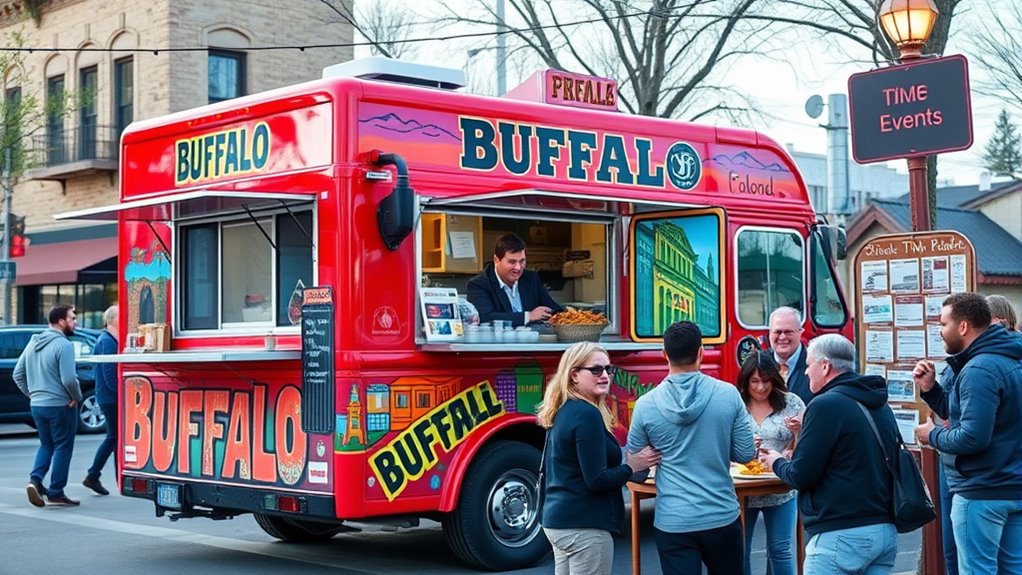
Building strong ties with the Buffalo community is essential for your food truck’s success. To do this, focus on active engagement strategies that foster relationships.
- Partner with local businesses for community partnerships that increase visibility and build trust.
- Sponsor local events to show your support and attract new customers.
- Participate in neighborhood festivals and farmers’ markets to boost your presence.
- Collaborate with local charities for fundraising events, demonstrating your commitment to the community.
These approaches help you create meaningful connections, encouraging loyalty and word-of-mouth promotion. By integrating community partnerships and local event sponsorships into your strategy, you’ll embed your food truck into Buffalo’s vibrant local scene and ensure long-term success.
Frequently Asked Questions
What Permits Are Needed to Park on City Streets in Buffalo?
You need a special permit to park your food truck on Buffalo city streets. Check parking regulations and street signage to guarantee you’re allowed in specific areas, as rules vary by zone. Apply for a street occupancy permit through the Buffalo Department of Permit & Inspection Services, and obtain any necessary health or business licenses. Always follow posted signage to avoid fines or towing, and verify your permit’s validity regularly.
How Can I Find Reliable Local Food Suppliers in Buffalo?
You can find reliable local food suppliers in Buffalo by visiting local food markets like the Elmwood Village Farmers Market or the West Side Bazaar. Build strong supplier relationships by regularly communicating your needs, ordering consistently, and requesting quality guarantees. Networking with other local vendors and attending industry trade shows also helps you discover trusted suppliers who provide fresh, quality ingredients for your food truck.
Are There Any Hidden Costs When Starting a Food Truck in Buffalo?
When starting a food truck in Buffalo, you should watch out for hidden fees like permits, licensing, and insurance costs that might not be obvious upfront. Unexpected expenses can also include maintenance, fuel, and equipment repairs. To avoid surprises, budget extra funds and research all local regulations thoroughly. Being prepared helps you manage costs effectively and keeps your food truck business running smoothly without financial setbacks.
What’s the Best Time of Year to Launch My Food Truck?
You should launch your food truck in late spring or early summer when seasonal demand is high and the weather is more predictable. This timing helps attract more customers who want outdoor dining and festivals. Avoid launching during winter, as harsh weather can limit foot traffic. Planning your debut around favorable weather conditions maximizes visibility and sales, giving your food truck the best start in Buffalo’s vibrant food scene.
How Do I Navigate Buffalo’s Health and Safety Inspection Process?
Buffalo conducts over 4,000 health inspections annually, emphasizing food safety. To navigate their process, familiarize yourself with local food safety protocols, ensuring your truck meets all requirements. Schedule your inspections early through the Buffalo Department of Health’s portal, and keep records organized. By proactively preparing and understanding inspection scheduling, you’ll pass smoothly, avoiding delays and ensuring your food truck complies with Buffalo’s high standards for safety and quality.
Conclusion
Starting a food truck in Buffalo is like planting a seed in fertile ground—you just need the right tools, a clear plan, and a dash of passion. By understanding local rules, crafting a mouthwatering menu, and engaging with the community, you’ll cultivate a thriving presence. With dedication and creativity, your food truck can become a shining star on Buffalo’s vibrant culinary sky, inviting everyone to taste your unique flavors and share in your success.
